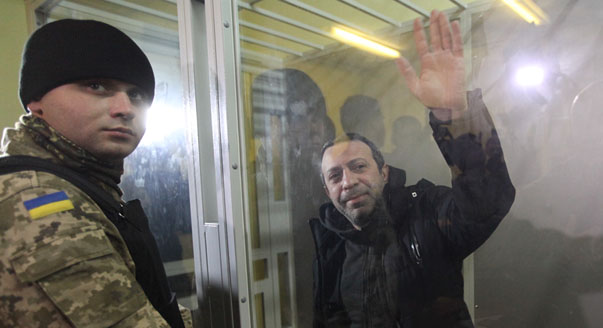In June 2014, Ukrainian President Petro Poroshenko called on newly-appointed Prosecutor General Vitaly Yarema to begin investigating corruption among high-level officials—including his close associates. The investigations were supposed to be a central part of Poroshenko’s plans to reform the country after the Euromaidan revolution ousted notoriously corrupt former president Viktor Yanukovych.
However, it has taken more than a year and a new prosecutor general, Viktor Shokin, for any high-level arrests to be made. These arrests have indicated to some that Poroshenko is finally getting serious about cracking down on corruption. Yet they have little to do with Poroshenko’s avowed desire to weed out graft. Rather, they are best interpreted as political maneuvering; an attempt to add money to the country’s coffers; and an effort to boost the president’s approval ratings.
On October 31, Gennady Korban, who is closely linked with oligarch and former Dnipropetrovsk governor Igor Kolomoisky and has opposed Poroshenko-backed candidates in consecutive elections, was arrested. Shokin, one of Poroshenko’s most loyal allies, charged Korban with a number of crimes, including establishing a criminal organization and kidnapping. Korban was arrested in a joint operation conducted by the Prosecutor General’s Office and other Ukrainian law enforcement agencies that involved 500 troops and a number of armored vehicles.
Over the course of the past year, the relationship between Poroshenko and Kolomoisky has deteriorated precipitously. Their animosity peaked this March as the two men vied for control over Ukrnafta, a state-run oil company. Armed men sent by Kolomoisky—who owns a minority stake in the company but controls the management—surrounded the Ukrnafta headquarters in Kyiv, resulting in a showdown between the two oligarchs. Shortly thereafter, the men came to an agreement: Poroshenko reportedly agreed to have Shokin drop criminal charges against Kolomoisky (who agreed to step down from his post as governor of Dnipropetrovsk) and to allow Ukrnafta to pay dividends to the state, the majority shareholder in the company.
Poroshenko has made similar deals with other oligarchs in the past. For example, Group DF—whose head Dmitri Firtas owns significant assets in the gas sector and was close to former president Yanukovych—is now being forced to repay its debts to Naftogaz, the state oil and gas monopoly. In return, Kyiv promised to unfreeze assets that belong to Firtash’s company.
Make Them Pay
Despite their deal, Kolomoisky apparently instructed the Ukrnafta management to not pay dividends to the state. This is money Poroshenko needs to bolster the country’s finances. With Kolomoisky allegedly not keeping his end of the bargain, the president decided to raise the stakes.
Poroshenko called the event a “new stage of de-oligarchization,” and his associates maintain that Korban’s arrest is part of a routine criminal prosecution that has no political undertones. (Korban’s record is by no mean spotless: he has boasted about being Ukraine’s number one corporate raider.) Unsurprisingly, the Kolomoisky camp contends that Korban was put in jail for rejecting the president’s demand that he leave politics. And there may be something to this: despite the severity of the charges against him, Korban was only placed under house arrest.
Kolomoisky’s own comments offer insight into what’s actually going on. After alluding to the political motives behind Korban’s arrest, Kolomoisky took a more conciliatory tone, saying that he does not feel pressure from the presidential administration, and that he and Poroshenko are “communicating normally.” This can be read as a signal that Kolomoisky is ready to compromise.
Few Arrests and Almost No Jail Time
Poroshenko’s campaign to tame Kolomoisky has had some unexpected side effects. The prosecution of Kolomoisky’s team looks particularly questionable in light of the fact that no carrharges have been brought against the allies of Poroshenko and Prime Minister Yatsenyuk who have been accused of corruption. What’s more, the Yanukovych administration officials implicated in embezzlement schemes and accused of violence against protesters during the revolution remain free.
Two days after Korban’s arrest, the Prosecutor General’s Office subpoenaed three former Party of Regions members who are now MPs in the opposition bloc: Vadim Novinsky, Oleksandr Vilkul, and Natalia Korolevskaya. According to the subpoenas, none of them had appeared for questioning. However, shortly thereafter, the targets of the investigation published derisive posts online saying that they would happily participate in the investigation at any time—implying that the prosecutor’s claims that they had failed to appear were disingenuous.
In the end, another Yanukovych associate, former justice minister Yelena Lukash, was arrested on charges of embezzlement. Lukash is well known to have supported violent crackdowns on protesters during the revolution. Indeed, her name is on the EU and Canadian sanctions lists. Still, Ukrainian law enforcement officials didn’t begin to look for her until September 10 of this year. Though they have finally found and arrested her, Lukash says that she was in Ukraine the entire time and wasn’t trying to hide from investigators. The court placed Lukash under arrest for two months, but Novinsky paid five million hryvna to bail her out of jail.
Because Poroshenko does not have a strong political faction backing him, he must rely on a patchwork of political alliances that are alternately cooperative and confrontational. The Kolomoisky case is just the starkest illustration of this dilemma: if Poroshenko begins investigating officials—whether from the Yanukovych regime or otherwise—he will quickly face an army of new enemies and upset the fragile balance that allows him to remain in power. If he does not weed out corruption, however, he will lose support from the voters who elected him, and the Western countries and institutions that have backed his government.





